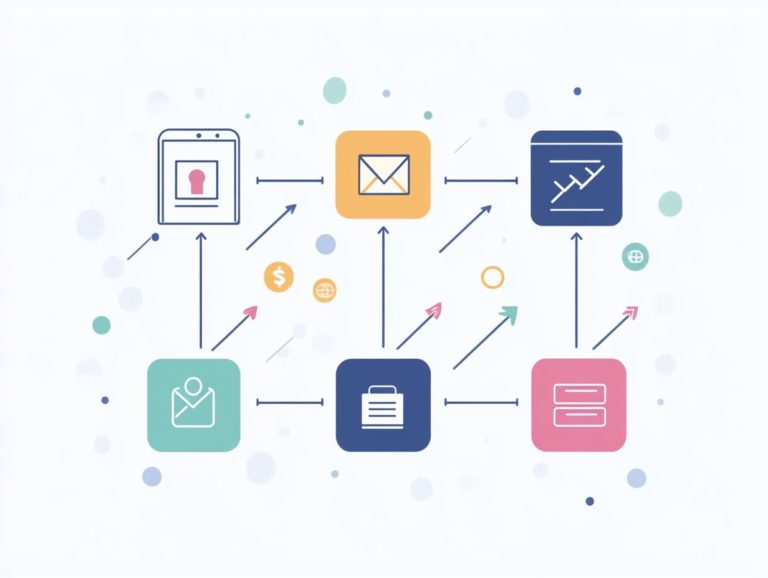The Evolution of CRM and Its Integrations
Customer Relationship Management (CRM) has transformed from simple record-keeping to advanced software systems that elevate business operations to new heights.
This article explores the rich history of CRM, highlighting the many benefits of integrating these systems into your business framework, as well as the diverse types of integrations currently available.
You ll discover critical factors to consider when selecting the ideal CRM integrations for your organization, along with insights into future trends that will shape this dynamic landscape.
Join us as we explore the evolution and potential of CRM technology.
Contents
- Key Takeaways:
- The History of CRM
- Benefits of CRM Integration
- Types of CRM Integrations
- Factors to Consider when Choosing CRM Integrations
- Future of CRM Integrations
- Frequently Asked Questions
- What is CRM and why is it important?
- How has CRM evolved over time?
- What are the benefits of integrating CRM with other systems?
- What challenges can arise from integrating CRM with other systems?
- How can businesses stay ahead of the evolution of CRM and its integrations?
- What are some popular integrations with CRM systems?
Key Takeaways:

- CRM has evolved significantly to meet modern needs.
- Integrating CRM with other systems can bring many benefits, such as efficient data management and enhanced customer satisfaction.
- Consider two main types of CRM integrations: third-party and custom integrations, each with unique advantages and challenges.
- When choosing CRM integrations, evaluate compatibility, scalability, cost, and implementation to ensure success.
- The future of CRM integrations looks promising, offering new opportunities to improve CRM strategies.
The History of CRM
The history of Customer Relationship Management (CRM) has evolved, adapting to changing customer interactions and technological advancements, including the importance of CRM integrations in 2024 that enhance data analysis and automation.
Initially centered on contact management, CRM systems have transformed dramatically. Sales teams and marketers can now deliver personalized experiences, revolutionizing customer journeys and significantly enhancing satisfaction across various industries.
Early Beginnings and Evolution
CRM systems originated as basic contact management tools focused on storing customer information and supporting efforts.
As businesses recognized the importance of nurturing customer relationships, these tools evolved into sophisticated solutions. Modern operational CRM systems now offer a range of functionalities, integrating automated workflows, advanced analytics, and real-time communication channels.
This evolution enables organizations to track customer interactions effectively and anticipate customer needs, enhancing the overall experience.
With the rise of cloud technology and AI-driven insights, CRM solutions have far surpassed their initial purpose, becoming essential for driving engagement and loyalty in today s competitive landscape.
Benefits of CRM Integration
Integrating CRM solutions offers a wealth of advantages. It streamlines customer interactions, elevates the customer experience, and boosts sales efficiency through better data integration and strategic marketing initiatives.
Embracing these tools can transform how you engage with clients, making every interaction more meaningful and effective.
Streamlining and Centralizing Data
One standout benefit of CRM integration is the ability to centralize customer data into a digital database. This provides a comprehensive view of customer interactions and preferences, which is invaluable for your business.
By harnessing AI-powered CRM solutions, you enhance this process. These tools automate data collection and offer intelligent recommendations based on historical behaviors, making it easier for teams to tailor outreach effectively.
With centralized data at your fingertips, you can track shifts in customer needs in real-time, ensuring your strategies remain relevant and impactful. These advanced CRM systems help you make informed decisions, leading to more personalized interactions and improved customer satisfaction.
Don’t miss out on the chance to transform your business with CRM integrations!
Improved Customer Experience

Customer Relationship Management (CRM) integration greatly enhances your customer experience by harnessing data analysis to deliver a personalized journey that aligns with individual behaviors and preferences. This not only fosters customer loyalty but also boosts user engagement.
By leveraging advanced analytics and insights from customer interactions, you can design targeted marketing campaigns that resonate with each person s unique desires. This tailored approach doesn t just personalize your communication; it cultivates a sense of belonging, making customers feel valued and understood.
As a result, you ll see an increase in repeat purchases and a strengthened trust in your brand over time. Proactive engagement through customized recommendations reinforces these positive experiences, leading to higher retention rates and nurturing a dedicated customer base that is genuinely passionate about what you offer.
Types of CRM Integrations
You’ll find a variety of CRM integrations available, each crafted to elevate your sales management and enrich customer interactions. For more details, check out using CRM integrations to drive sales growth. These include third-party integrations that seamlessly connect different business tools, as well as custom integrations specifically tailored to meet your unique organizational requirements.
Third-Party Integrations
Third-party integrations in CRM solutions enable you to connect with a variety of external applications, elevating functionalities like marketing automation and highlighting the importance of real-time CRM integrations for offering deeper insights into customer behavior.
Leverage tools such as Mailchimp for email marketing or HubSpot for managing comprehensive sales pipelines. You can streamline your outreach efforts and customize campaigns to resonate with specific audience segments.
Integrating analytics platforms like Google Analytics allows you to gain a more nuanced understanding of customer behavior, enabling you to make informed, data-driven decisions.
These integrations save you valuable time and enhance collaboration across departments, ensuring your marketing and sales teams work in harmony toward shared objectives.
Ultimately, these enhancements boost operational efficiency and foster stronger customer relationships, making third-party integrations an invaluable asset in today s competitive landscape.
Custom Integrations
Custom integrations in CRM systems enable you to tailor functionalities to meet your unique operational needs, boosting your sales efficiency while ensuring that the CRM aligns perfectly with your specific business objectives. For more insights, consider exploring understanding CRM integration costs and benefits.
This level of customization allows you to adapt workflows seamlessly, connect disparate systems, and streamline processes that are vital for effective customer relationship management.
By emphasizing the integration of tools that resonate with your exact requirements, you can eliminate redundancies and minimize manual data entry. Ultimately, you cultivate a more cohesive and productive environment.
Leveraging operational CRMs with tailored integrations not only enhances your sales performance but also elevates customer satisfaction through more personalized and responsive service, paving the way for long-term success and profitability. For insights, check out the top CRMs for seamless integrations.
Factors to Consider when Choosing CRM Integrations
When you select CRM integrations, consider key factors such as:
- Compatibility with your existing systems
- Scalability for future growth
- Cost-effectiveness
- Ease of implementation
- Data privacy and security
Compatibility and Scalability

Evaluating the compatibility and scalability of CRM solutions is essential to ensure seamless software integration and to future-proof your business against evolving needs.
When you consider how well these systems communicate with your existing technology, you can pinpoint potential bottlenecks and operational inefficiencies that could impede performance. Choosing the right CRM can be a game-changer as it grows with your company!
A well-integrated CRM solution enhances user experience and fosters better decision-making through comprehensive data analysis.
By focusing on these aspects, you enable yourself to make informed choices that support sustained growth and give you a competitive edge.
Cost and Implementation
Cost and implementation are important factors that can shape the success of your CRM integration. It’s essential to weigh your budget constraints and anticipated ROI before making a decision.
Without a thorough understanding of the financial implications, you might overspend on tools that don t align with your objectives. Unexpected costs associated with software, training, and maintenance can throw a wrench in even the best-laid plans, highlighting the need for a clear financial strategy.
Planning for effective integration is crucial. This ensures your chosen CRM system works seamlessly with existing processes, boosting user adoption and overall efficiency.
Companies that prioritize these aspects often enjoy a favorable return on investment. Therefore, thoughtful consideration of costs is a cornerstone of successful CRM adoption.
Future of CRM Integrations
Exciting new technologies are shaping the future of CRM integrations, especially with the incorporation of AI tools and predictive analytics. AI tools are software that uses algorithms to simulate human intelligence, while predictive analytics leverages data to forecast future trends.
These innovations can transform customer engagement and elevate operational efficiency, ensuring you stay ahead in a competitive landscape.
Emerging Technologies and Trends
Emerging technologies like AI tools and predictive analytics are poised to revolutionize the CRM landscape. They enable you to extract actionable customer insights from big data and enhance your engagement strategies.
These innovations help you gain a deeper understanding of customer behaviors and preferences. This allows you to tailor your outreach efforts with precision.
By utilizing in-depth data analysis, you can craft personalized marketing campaigns that resonate with clients, nurturing stronger loyalty and satisfaction.
This means you can adapt quickly to customer needs, ultimately enhancing your client relationships.
As these technologies continue to evolve, the potential for a seamless customer experience becomes more achievable, positioning you to excel in a competitive marketplace.
Frequently Asked Questions
What is CRM and why is it important?

CRM stands for Customer Relationship Management. It is a strategy and technology used by businesses to manage and analyze their interactions with customers and potential customers. CRM is important because it helps businesses build and maintain strong relationships with customers, ultimately leading to increased sales and customer satisfaction.
How has CRM evolved over time?
CRM has evolved from a simple contact management tool to a complex system that integrates various processes and data points. Initially used mainly for sales and marketing, CRM has expanded to include customer service, analytics, and more. This evolution highlights the impact of CRM integrations on user experience and has also shifted from being solely on-premise to cloud-based solutions.
What are the benefits of integrating CRM with other systems?
Integrating CRM with other systems, such as ERP or marketing automation, provides a holistic view of customer data and streamlines processes. Understanding what CRM software integrations can improve customer service, increase operational efficiency, and lead to better data-driven decision-making.
What challenges can arise from integrating CRM with other systems?
Challenges can include compatibility issues, data inconsistencies, and security concerns. It’s important to plan and strategize the integration process carefully to ensure a smooth and successful implementation.
How can businesses stay ahead of the evolution of CRM and its integrations?
Businesses can stay ahead by monitoring industry trends and advancements in CRM technology. Regularly reviewing and updating your CRM strategy is essential. Training employees on how to use the system effectively is also crucial. Working with a reliable CRM provider can help businesses remain current with the latest developments and integrations.
What are some popular integrations with CRM systems?
Popular integrations include marketing automation tools, social media platforms, e-commerce platforms, accounting software, and customer service tools. These integrations allow for a more comprehensive and efficient approach to managing customer relationships and interactions.
In conclusion, understanding the landscape of CRM integrations is essential. Leveraging new technologies, such as the rise of AI in CRM integrations, can position your business for success. Act now to stay ahead of the competition!






